

Tanárblog - Tíz weboldal képregény készítéshez. Tíz weboldal... - 2011. november 9.
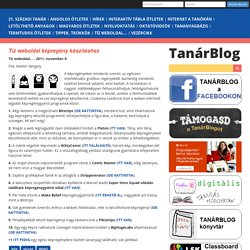
A képregényeket mindenki szereti, az egészen intellektuális grafikus regényektől Garfieldig mindenki találhat bennük valamit, amit kedvel. A tanításban is nagyon sokféleképpen felhasználhatjuk, feldolgozhatunk vele történeteket, gyakorolhatjuk a nyelvet, de nálam az is bevált, amikor a fémhulladékok kezeléséről kellett vicces képregényt készíteniük. Csokorba szedtünk tízet a weben elérhető legjobb képregénygyártó programok közül: 444. Gépnarancs. NodeXL: Network Overview, Discovery and Exploration for Excel. NodeXL is a free, open-source template for Microsoft® Excel® 2007, 2010 and 2013 that makes it easy to explore network graphs.
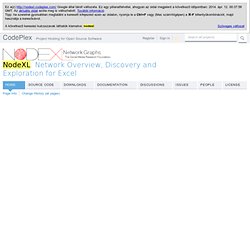
With NodeXL, you can enter a network edge list in a worksheet, click a button and see your graph, all in the familiar environment of the Excel window. Visit the NodeXL Graph Gallery to see the wide variety of graphs that have been created by the NodeXL community. What's New A new Import from Twitter Users Network feature in the latest release replaces two older Twitter importers that became less useful when Twitter introduced strict rate limits. NodeXL will now automatically update itself when a new release becomes available. See the Complete NodeXL Release History for details. NodeXL Features Flexible Import and Export Import and export graphs in GraphML, Pajek, UCINet, and matrix formats. NodeXL for Programmers The NodeXL template displays graphs using a custom Windows Presentation Foundation (WPF) control that can be reused in custom applications.
Filmhíradók Online. Statek. Teakult. Refine - Google Refine, a power tool for working with messy data (formerly Freebase Gridworks) Google refine basic. Tutorial.pdf (application/pdf objektum) Find Keyword Modifiers with Google Refine. Keyword research is a vital component of SEO.
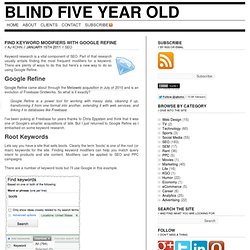
Part of that research usually entails finding the most frequent modifiers for a keyword. There are plenty of ways to do this but here's a new way to do so using Google Refine. Google Refine Google Refine came about through the Metaweb acquisition in July of 2010 and is an evolution of Freebase Gridworks. So what is it exactly? Google Refine is a power tool for working with messy data, cleaning it up, transforming it from one format into another, extending it with web services, and linking it to databases like Freebase.
I've been poking at Freebase for years thanks to Chris Eppstein and think that it was one of Google's smarter acquisitions of late. Root Keywords Lets say you have a site that sells boots. There are a number of keyword tools but I'll use Google in this example. There are 794 keyword suggestions and many of them overlap with one another. Combining data with Google Refine. Linkedgov/linkedgov-google-refine-extension - GitHub. Freebase Gridworks 1.0 Overview. Faceting with Freebase Gridworks. Hunglish korpusz. The sentence pairs were created from document pairs by automatic methods.
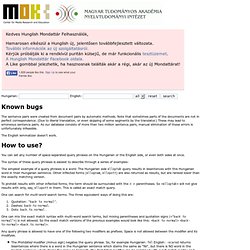
Note that sometimes parts of the documents are not in perfect correspondence. (Due to liberal translation, or even skipping of some segments by the translator.) These may lead to erroneous sentence pairs. As our database consists of more than two million sentence pairs, manual elimination of these errors is unfortunately infeasible. The English lemmatizer doesn't work. You can set any number of space-separated query phrases on the Hungarian or the English side, or even both sides at once. The syntax of these query phrases is easiest to describe through a series of examples: The simplest example of a query phrases is a word: The Hungarian side ellopták query results in bisentences with this Hungarian word in their Hungarian sentence. To prohibit results with other inflected forms, the term should be surrounded with the < > parentheses.
One can search for multi-word search terms. Quotation: "back to normal". Ubuntu. Project Hosting. Interactive Dynamics for Visual Analysis. Graphics Jeffrey Heer, Stanford University Ben Shneiderman, University of Maryland, College Park The increasing scale and availability of digital data provides an extraordinary resource for informing public policy, scientific discovery, business strategy, and even our personal lives.
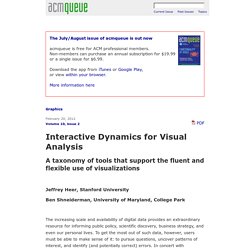
To get the most out of such data, however, users must be able to make sense of it: to pursue questions, uncover patterns of interest, and identify (and potentially correct) errors. In concert with data-management systems and statistical algorithms, analysis requires contextualized human judgments regarding the domain-specific significance of the clusters, trends, and outliers discovered in data.
Visualization provides a powerful means of making sense of data. The goal of this article is to assist designers, researchers, professional analysts, procurement officers, educators, and students in evaluating and creating visual analysis tools. Some visualization system designers have explored alternative approaches.